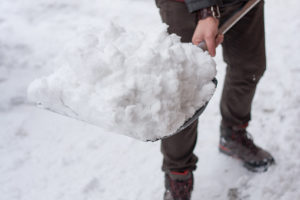Winter and snow go hand in hand and this weekend’s forecast calls for snow. In preparation of this, Flushing Hospital would like to provide you with some heart health tips before you go out to shovel snow.
By now, we have all heard about the risk of shoveling snow and suffering a heart attack, but is this true? The fact is shoveling snow (or to a less extent, even pushing a heavy snow blower) is considered a more strenuous activity than running full speed on a treadmill. But why should pushing around some white flakes be more dangerous than any other form of exercise?
The biggest reason why heart attacks are so common while snow shoveling has as much to do with the weather as it does with the activity. The cold temperature is a key contributor to the onset of a heart attack. Frozen temperatures can boost blood pressure, interrupt blood flow to the heart, and make blood more likely to clot.
Another factor to consider is who is doing the shoveling. If you are a healthy and physically fit individual there is much less of a risk to suffer a heart attack, but unfortunately not everyone who attempts to shovel snow fits into that category. For those who do not exercise as frequently, (especially during the winter when we tend to be less active) or have a history of hypertension or heart disease need to follow the following tips before going out to shovel:
- Avoid shoveling as soon as you wake up as this is when most heart attacks occur
- Do not drink coffee, eat a heavy meal or smoke cigarettes immediately before or while shoveling
- Warm up your muscles before you begin
- Shovel many light loads instead of fewer heavy ones
- Take frequent breaks
- Drink plenty of water to avoid dehydration
Know the early signs and symptoms of a heart attack. If you experience a squeezing pain in your chest, shortness of breath, racing heartbeat, pain radiating from your left shoulder and down your left arm, cold sweats, accompanied by fatigue and nausea, stop shoveling, go inside and call 911 immediately.
If you are at a high risk of suffering a heart attack, avoid shoveling snow completely. Try asking a family member, friend or neighborhood teen to help you out.
All content of this newsletter is intended for general information purposes only and is not intended or implied to be a substitute for professional medical advice, diagnosis or treatment. Please consult a medical professional before adopting any of the suggestions on this page. You must never disregard professional medical advice or delay seeking medical treatment based upon any content of this newsletter. PROMPTLY CONSULT YOUR PHYSICIAN OR CALL 911 IF YOU BELIEVE YOU HAVE A MEDICAL EMERGENCY.

